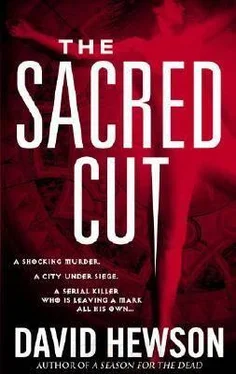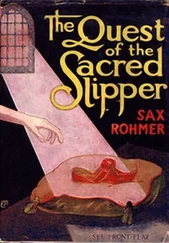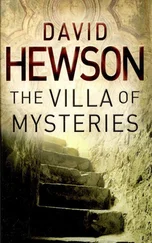They were crowding round the FBI agent, pushing, hustling. Alexa was nowhere to be seen.
“Gianni!” Costa yelled, then saw something metallic flash in the light of the brazier.
Emily saw it too. She dodged the halfhearted lunge with the knife and kicked the youth behind it hard in the crotch. He went down, screaming, but there were a dozen more of them now, crowding round her, starting to yell.
And the slight figure was moving too. Edging out at the back, seizing her opportunity.
Costa swiftly thought about the options, came to the conclusion there was just one. He fired off two shots into the empty sky, watching carefully to see that they understood what the deadly racket meant for them.
The girl was breaking into a sprint, moving quickly towards the next set of steps. She was on her own now, clear in a retreating sea of dark, furious bodies.
“Oh great,” Emily Deacon barked at him. “And I thought we were the ones who were supposed to be gun-happy?”
“Just making sure I take you back to Mr. Leapman in one piece like he asked,” Costa said. “How good are you at running?”
“Damn good,” she replied.
He nodded at the bridge. “Take these steps. See where she goes when she emerges. I’ll go after her. Gianni, you stay with Emily.”
Peroni was heading for the stone stairway already.
A good twenty metres ahead of him, Nic Costa saw the girl tumble, slipping on the slushy pathway, then scramble up and continue to flee. He took a deep breath, broke out from under the bridge and set off in her tracks.
It was a minute before he reached the next set of steps. He raced up them, following her footprints in the snow, thinking all along it had been a mistake to loose off those shots, not quite knowing why.
Then he climbed back to the road level, checked Peroni and Emily waiting for his lead a couple of hundred metres down the Lungotevere, Alexa by their side, her cigarette sending a thin plume of smoke up into the icy night air.
Costa glanced across the street and saw the slim, young figure of the girl slip into the snarl of alleys adjoining Corso Vittorio Emanuele.
Watching her disappear, in the dun security lights of a grocery store, was a tall, upright man dressed in black.
THE HERETICAL MONK Giordano Bruno died at the stake in the Campo dei Fiori on a cold February day in 1600. Now his black, hooded statue stood on a pedestal in the centre of the square, dispassionately surveying the twenty-first century. The trash from the daily market-wooden boxes, limp vegetables, plastic bags-lay in the filthy slush, uncollected by market workers who’d pleaded the weather as an excuse for skipping work. Only a handful of late-night drinkers braved the snow to make the customary round of bars, the Americans heading for the Drunken Ship and Sloppy Sam’s, the locals to the Vineria and the Taverna del Campo. And around the statue, huddling against the wind, wondering how to make money, a bunch of down-and-outs, permanent hangers-on in a part of the city that was never short of tourists to work.
Of the hundred or so people milling around the Campo that night Emily Deacon was one of the few who knew who Giordano Bruno was. She could, if she wanted, recall the reasons why an eccentric recluse, one who brought about his own death through sheer stubbornness towards a vengeful authority, became a founding father of modern humanist philosophy. She’d visited the square often as a teenager and, as her family gradually fell apart, come to wonder what Bruno, a man convinced the world of the future would be immeasurably better than the one he inhabited, would make of modern-day Rome. These ideas rolled around her consciousness now. She knew the city so well, the place brimmed with so many memories, good and bad, that it was hard to focus on what mattered. Leapman had brought her to Rome, surely, for her specialist knowledge. Maybe he was wrong. Maybe he’d be better off with someone who was fresh, untouched by the scars and connections of the past. And these thoughts themselves touched a raw nerve. They were unwanted, unnecessary. Emily knew she had a job to do, an important one. A job that could close this case for good because, when she’d left Peroni gasping for breath in the back streets near the bridge, when she’d realized Nic Costa had taken his own path and was now lost to her in the night, she’d found the girl herself, tracked her doggedly through the labyrinth of medieval alleys, over the broad main road of Corso Vittorio Emanuele, then past the Palazzo della Cancelleria, towards the Campo, noting, too, that they were not alone. Emily Deacon could run. She was as fast as the girl, faster probably. Whoever was following them was also fit, but older, a black figure flitting through the shadows, with one clear intent as he struggled to keep up with them.
She turned the corner into the Campo and knew what she’d see. The kid was predictable. She headed for crowds, particularly those she thought of as hers. Sure enough, the slight young figure was slowing now, strolling into the knot of bodies by the statue, hoping to be anonymous again. Emily cast a worried glance behind her and saw nothing. Not a soul was moving down the narrow medieval thoroughfare of the Via del Pellegrino, and she tried to convince herself she’d lost the man.
“But he’s good,” she muttered, and took out her issue revolver, put it snugly in the right-hand pocket of her jacket, then placed the pair of regulation handcuffs she carried in her left, wishing all the time she’d paid more attention during the repetitive, noisy tedium of the firearms classes back in Virginia.
She put her head down, stared at the grubby snow and began to cut a diagonal path across the square, marking out a decent distance from the statue, looking, she hoped, like any passerby moving through the night.
Laila was cowering there, hiding herself in a crowd of youths. Emily didn’t like what she saw. The girl looked odd.
Emily locked one cuff around her own left wrist, keeping the metal hidden from view. They could spend all night running around Rome after this girl. It was important to bring her to a halt here.
Then she doubled back to the statue quickly, silently slipped between two youths sharing a joint, stood beside the girl and placed a hand on her arm.
“Laila,” she said quietly, firmly, “there’s nothing to worry about. We’re here to help.”
The kid turned, her pale face shining with pure terror.
“It’s all right,” Emily said.
But Laila was ready to run again and there was no option. Emily reached out, took Laila’s slender right wrist, and locked the right handcuff around it, tight to the soft skin. The girl leapt away from her, as if touched by an electric shock. The others were beginning to mill round the two of them, not taking any notice when she kept on yelling, “Police, police.”
Laila almost dragged her off the steps. Someone’s hand tried to separate them, jerking hard on the cuff chain. It was the scene by the river all over again, and Emily thought of the options in front of her, thought about how carrying a knife was, in circles like these, just part of everyday life. Finally, she remembered what Nic Costa had done in similar circumstances. She needed help. She needed to make a point.
Emily Deacon took the gun out of her right-hand pocket, held it high in the air and, for the second time that night, two shots burst towards the luminous disc of the moon.
“Nic!” she yelled. “Peroni!”
The youths got the message. They were moving back, looking scared, ready to run, to get as far away from trouble as possible. There were faces at the windows of the Campo bars but no sign of movement. The shot had bought her time. Now she needed assistance.
“Nic!” she screamed again and pushed the girl hard into the stone pedestal of the statue to stop her trying to drag herself away.
Читать дальше










